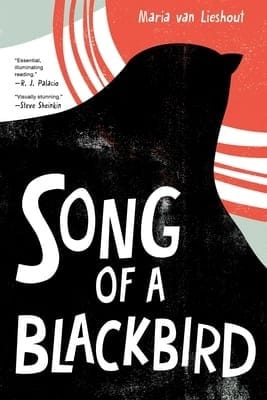Flashbacks
Looking at parallels between the Dutch Resistance to the Nazis and current events in the United States, Craig Wiesner shares the thoughts he had during a book talk by the author of Song of A Blackbird.

by Craig Wiesner - San Mateo Daily Journal - June 2, 2025
The flashback was beautiful. I was invited to a Jewish temple to sell books for Maria Van Lieshout’s talk about her graphic novel Song of A Blackbird. As I waited I heard children singing in Hebrew, words and melodies and the thump thump thumps of little hands reminded me of my childhood Hebrew School. Soon children and adults came in and we were mesmerized by Van Lieshout sharing the stories that inspired her to create the book.
The Book: In 1943 Amsterdam, Emma Bergsma’s world changes when she witnesses Jewish families being forcibly deported to concentration camps. That pivotal moment lights a fire within her, and she decides to join the Dutch Resistance, drawn into a clandestine world of printing presses and counterfeiters, with thousands of lives on the line.
In 2011 Amsterdam, teenage Annick’s world changes, searching for a bone marrow donor for her beloved oma leading to a shocking revelation: her grandmother was secretly adopted as a child. The only clues to finding their lost family are a series of art prints—each signed by a mysterious “Emma B.”
This novel weaves together two timelines to reveal how art, in the face of political upheaval and nearly insurmountable adversity, can become our greatest lifeline.
Van Lieshout shared stories of the people she based the book on, heroic members of the Netherlands resistance. As she talked about people being rounded up, the free press becoming purveyors of propaganda, schools losing their freedom, historic institutions dismantled, too few speaking out, my chest tightened, anger bubbling up. I wondered if others felt the same.
Hours earlier I had donated money to send two American children to their mother’s home country. Their mother had shown up for a routine ICE (Immigration and Customs Enforcement) appointment and was suddenly deported. Her children, U.S. citizens, had no other caregivers. The painful decision was made to send them to their mother, to a country they had never seen. I thought of them as Van Lieshout told us about Jewish children, separated from their parents at a Nazi deportation center, who, with their parents’ secret permission, were whisked away to other families through an underground railroad. Most never saw their parents again. 102,000 Dutch Jews were killed in the Holocaust. The resistance saved 600 children.
I was thinking of today’s America, people rounded up and deported, visa-holders thrown into jails without due process, children separated from their parents, an American child with late stage cancer deported, homes burst into by masked armed agents, with warrants for the wrong people, mothers and children forced outside in their underwear, a student accosted outside her home, handcuffed, taken hundreds of miles away to jail, whose only “crime” was writing an op-ed, major universities being attacked - funding slashed, mainstream media threatened with lawsuits and lost licenses, law firms barred from entering federal courts, lists of disabled people gathered for “studies,” university professors getting federal government texts asking if they’re Jewish, government civil/human rights agencies dismantled, judges threatened with impeachment with one handcuffed and arrested outside her courtroom, the U.S. Attorney General bragging about signing death warrants… All of that was rattling in my head.
Van Lieshout ended by showing photographs of the story’s main WWII characters. Most didn't survive but they saved thousands of lives. After a few general questions one person brought up parallels with today. I could see how some of us had been holding something tightly in our chests, and suddenly, it was released, free. I’ll paraphrase what one person said: During the war horrible atrocities were committed. Millions were murdered. But during the years leading up to the war it all could have been prevented. If only people had stood up and resisted earlier, when the seeds of hate were being planted, as the structures of democracy were dismantled, countless lives could have been saved.
It is always dangerous to compare any moment to what led to the Holocaust, but there I was, sitting in a room full of Jewish people, my skin crawling because history may not repeat, but it clearly rhymes. Just as I felt a warmth wash over my body hearing Jewish children singing in Hebrew, dread gripped me hearing Van Lieshout’s story. How many more Jewish children might there be today, singing in Hebrew schools, if six million of us hadn’t been slaughtered? 85 million people died in WWII, countless others wounded, entire nations forever traumatized.
Will we hear the song of a blackbird now, trying to get the attention of a generation bombarded by noise, to stand up against tyranny right here at home? If not, an era of darkness may be near, from which there might be no escape.
Here are the first lines of the book: I’m singing to you. Yes you. WILL YOU LISTEN?
Craig Wiesner is the co-owner of Reach And Teach, a book, toy and cultural gift shop on San Carlos Avenue in San Carlos. Follow Craig: craigwiesner.bsky.social
HUGE NEWS!!!! Song of a Blackbird is long-listed for the 2025 National Book Award.
Buy the Book Here (or at your favorite independent bookstore!)
